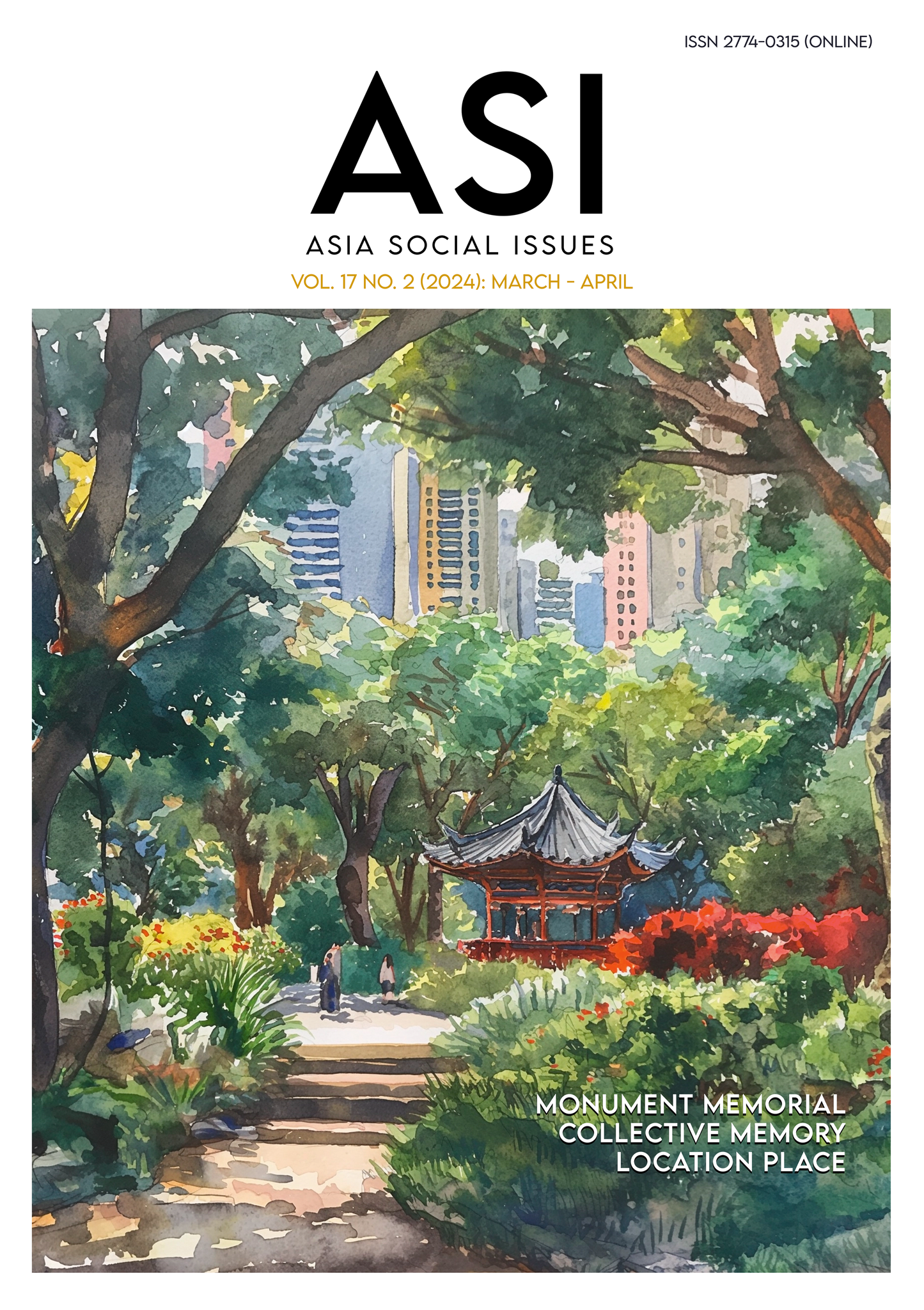The Application of Place-Based Education in Social Studies of Grade 5 Bhutanese Students
Main Article Content
Abstract
This quasi-experimental study investigated the improvement of students’ learning achievement and learning satisfaction using Place-Based Education (PBE) in teaching and learning Social Studies of grade 5 Bhutanese students. A mixed method was used with a total of 31 students selected through a purposive sampling from one of the semi-urban schools in western Bhutan. The quantitative data collected through the pretest and posttest were analysed and interpreted using an inferential statistics t-test with p ≤ 0.05 level of significance, mean, and standard deviation. Similarly, qualitative data was collected through the semi-structured interview and the data were analysed using thematic analysis. The result of the pretest and the posttest score analysis showed a significant difference between the posttest mean (14.45) and the pretest mean (8.37) with a mean difference of 6.08. The significant (p) value was .01, indicating a significant increase in the posttest scores as compared to the pretest. Subsequently, the data analysed from the interview confirmed that students derived positive learning satisfaction. Thus, the Place-Based Education approach enhances learning in Social Studies and this study recommends that teachers may also try teaching other subjects using the PBE approach to make their lessons engaging and exciting for the learners.
Article Details

This work is licensed under a Creative Commons Attribution-NonCommercial-NoDerivatives 4.0 International License.
Copyright: CC BY-NC-ND 4.0
References
Akbaş, Y., & Çakmak, S. (2019). The effect of place-based education integrated project studies on students’ problem-solving and social skills. Asian Journal of Education and Training, 5(1), 183-192.
Dorji, K., Kinley, & Sivitskis, A. (2021). Implementation of place-based education: A case study in a primary school at Talhog vang, Bhutan. Creative Education, 12, 2390-2409.
Dorji, T. (2021). The application of think-pair-share for social studies of grade six Bhutanese Students (Master’s thesis). Bangkok, Thailand: Rangsit University.
Essays, UK. (2013). Why is ethical consideration important in social research? Retrieved from http://www.ukessays.com/essay/socail-policy/ethical-consideration.php?
Griffin, E. (2017). The role of critical pedagogy in place-based education: A literature review. SCE Journal, 1, 21-35.
Griffin, E. (2019). A small, Bhutanese village school leading the way in place-based education. Retrieved from https://www.tetonscience.org/a-small-bhutanese-village- school-leading-the-way-in-place-based-education
Gyeltshen, L., & English, R. (2021). Enhancing 6th grade students’ learning in Social Studies through technology based teaching approach. Shanlax International Journal of Education, 10(1), 106-113.
Ihejiamaizu, C. C., Ukor, D. D., & Neji, H. A. (2018). Utilization of 5Es’ constructivist approach for enhancing the teaching of difficult concepts in biology. Global Journal of Educational Research, 17(1), 55-60.
Johnson, R. B., Onwuegbuzie, A. J., & Turner, L. A. (2007). Toward a definition of mixed methods research. Journal of mixed methods research, 1(2), 112-133.
Kezang, N. (2019). The application of place-based inquiry approach on grade 6 Bhutanese students in learning environmental science (Master’s thesis). Bangkok, Thailand: Rangsit University.
Koinis, N. J. (2016). An Evaluation of the Impacts of the Teton Science Schools Place-Based Education Professional Development Workshops for Teachers in Bhutan. Retrieved from https://repository.uwyo.edu/smtc_plan_b/49
Kolb, D. A. (1984). Experiential learning: Experience as the source of learning and development. Retrieved from https://simplypsychology.org/learning-kolb.html
Linnemanstons, K., & Jordan, C. (2017). Learning through place: Evaluation of a professional development program for understanding the impact of place-based education and teacher continuing education needs. Journal of Sustainability Education, 12(February). Retrieved from http://www.susted.com/wordpress/content/learning-through-place-evaluation- of-a-professional-development-program-for-understanding-the-impact-of-place-based-education-and-teacher-continuing-education-needs_2017_02/
McLeod, S. (2020). Vygotsky’s sociocultural theory of cognitive development. Retrieved from https://www.simplypsychology.org/vygotsky.html
Ministry of Bhutan. (2014). Bhutan Education Blueprint: Rethinking Education. Thimphu: Bhutan.
Mufalo, S. M., Muleya, G., & Simui, F. (2021). Exploring the global emergence of social studies at junior secondary school: A glance on literature. International Journal of Research and Innovation in Social Science, 5(7), 694-703.
Pasiechnyk, C. L. (2018). Place-based education: Improving learning while connecting students to community and environment (Master’s thesis). Canada: University of Victoria.
PEEC. (2010). The benefits of place-based education: A report from the place-based education evaluation collaborative (2nd eds.). Retrieved from https://promiseofplace.org/sites/default/files/2020-06/PEEC%2C%202010%20summary.pdf
Powers, E.L. (2004). An evaluation of four place-based education programs. The Journal of Environmental Education, 35(4), 17-32.
Rashmi. (2020). Aims and objectives of teaching social studies. Retrieved from https://www.teachersadda.com/aims-and-objectives-of-teaching-social-studies
Rashmi. (2020). Aims and objectives of teaching social studies. Retrieved from https://www.teachersadda.com/aims-and-objectives-of-teaching-social-studies
Rinzin, C. Y. (2021). Reforming the education system. Kuensel. Retrieved from https://docs.google.com/document/d/1Mv-A7WhU3IAfhWu57LVvsYlaCSMLHWMK2xwmZxpYXmo/edit
Rinzin, C., Y. (2021, January 16). Reforming the education system. Kuensel. Retrieved from https://docs.google.com/document/d/1Mv-LVvsYlaCSMLHWMK2xwmZxpYXmo/edit
Royal Education Council of Bhutan. (2018). New normal curriculum social studies curriculum framework class: IV-VI. Paro, Bhutan.
Royal Education Council of Bhutan. (2020). New normal curriculum social studies curriculum framework class: IV-VI. Paro: Royal Education Council.
Royal Education Council of Bhutan. (2020). New normal curriculum social studies curriculum framework class: IV-VI. Paro, Bhutan.
Royal Education Council of Bhutan. (2021). Social studies class VI. Paro: Royal Education Council.
Schneider, C. (2016). 4 steps to make your field trip matter. Getting Smart. retrieved from https://www.gettingsmart.com/2016/11/16/4-steps-to-make-your-field- trip-matter/
Semken, S. (2005). Sense of place and place-based introductory geoscience teaching for American Indian and Alaska Native undergraduates. Journal of Geoscience Education, 53(2), 149-157.
Sherab, K., & Dorji, P. (2013). Bhutanese teachers’ pedagogical orientation in the primary classes: A factor on quality education. Journal of the International Society for Teacher Education, 17(1), 18-28.
Smith, G. A., & Sobel, D. (2010). Place- and community-based education in schools. New York: Routledge.
Smith, G.A. (2002). Place-based education learning to be where we are. Phi Delta Kappan, April, 584-594
Sobel, D. (2004). Place-based education: Connecting classrooms & communities. Great Barrington, MA. Orion.
Tinder, C. (2018). The impacts of place-based education in a middle school science classroom. Retrieved from https://scholarworks.montana.edu/xmlui/handle/1/14811
Vygotsky, L. S. (1978). Mind in society: The development of higher psychological processes. Cambridge, MA: Harvard University Press.
Yilmaz, A. M., & Karakuş, U. (2018). The impact of place-based education approach on student achievement in social studies. Review of International Geographical Education Online, 8(3), 500-516. Retrieved from http://www.rigeo.org/vol8no3/Number3winter/RIGEO-V8-N3-5.pdf
Young, C. (2017). Benefits of fun with camp on undergraduate nutrition students’ education. ProQuest Dissertations & Theses Global.
Zach. (2021). What is content validity? Statoloay. Retrieved from https://www.statology.org/content-validity


